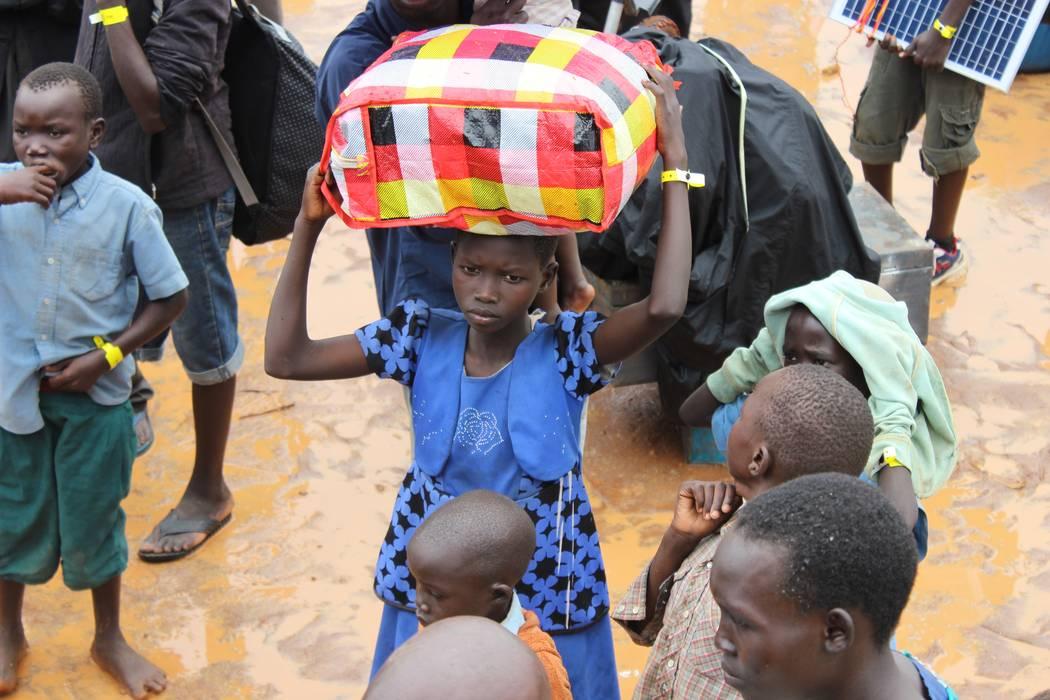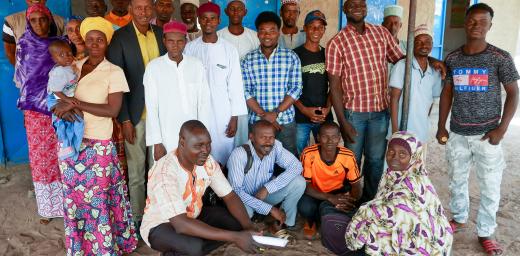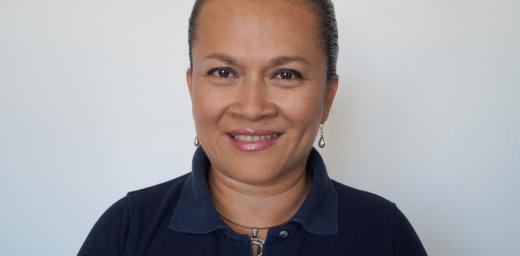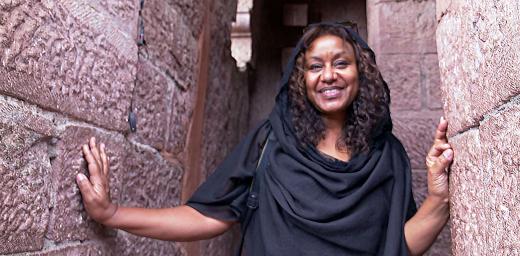Forty-one refugees a minute

A child arrives arrives at the Elegu collection point on the South Sudan-Uganda border with what she can carry. Photo: LWF/P. Kikomeko
LWF Uganda staff member Betty Lamunu is doing her best to support South Sudanese refugees streaming to the Elegu border point, Uganda.
Today, 19 July 2016, is yet another day for the LWF Emergency workers in Adjumani. Just like the day before and most likely the days to come, the children and women (and very few men) arrive in long convoy from South Sudan to Elegu border point in Uganda, where they are received at the collection/transit Center. Over 5,000 people have been registered so far, and many more are waiting for registration, while the convoys continue to flow in.
As they walk through the gate, the desperation of the refugees flows from their innermost being. The very depth of their souls and every inch of their bodies seem to cry out. They seem to have anger and so many questions that they cannot ask.
More than survival
For more than five hours, new arrivals streamed non-stop through the gate of our collection center at Elegu. We did a quick count at the gate for an hour and on average, 41 people were entering in a minute. The sight of children brings tears to your eyes and turns your stomach. Emaciated babies, toddlers and children make up the largest part of the refugees. All have that painful desperate look in their faces. They may be too young to understand what is happening but their souls tell them that something is gravely wrong. Surely, child protection programming will have to be scaled up for sustainable peace and security in the future. Our help will have to go beyond “just survival”.
The sight of children brings tears to your eyes and turns your stomach. Emaciated babies, toddlers and children, make up the largest part of the refugees. All have that painful desperate look in their faces.
At the Elegu collection center, managed by LWF, LWF community service and protection teams register new arrivals, note their tribal affiliations and special needs, refer them for quick medical screening, orient them on the laws of Uganda, support unaccompanied minors and those with special needs, such as people with disabilities, the elderly, pregnant women with assorted basic materials, like clothes.
I cannot help but wonder what the children are thinking about all this. Who can explain to them that life does not have to be that way? I met Martha, a 14-year-old who was in boarding school when the fighting started. She managed to run back home, hoping to find safety. She found both her parents burnt in their house. She arrived to smoking ruins and the stench of burning flesh. Martha was brought along to Uganda by a neighbour and handed over to LWF. Who can explain everything that has happened to Martha?
Stand with refugees
Among the refugees was also Denis, a 12-year-old, who also arrived without his parents. He does not know their whereabouts. “When our home was attacked, I ran alone into the bush and I don’t know where my parents are. The armed men were firing their guns in every direction and it seemed they wanted to kill all people. They are very bad. They have no kindness. I don’t know if my parents are alive or dead. I worry about them,” Denis told me in tears.
I myself want to ask these questions. How many are yet to die? Whose blood has not yet been shed? Whose daughter has not yet been raped? How many mothers are crying over the suffering of their children? Whose son has not been killed in fighting? Who has not yet run away from his or her home to seek refuge somewhere else? Who has not yet lost property and livelihood? A thousand questions must be asked about the situation of the persisting conflict in South Sudan. What should we as adults tell these children? What can the world tell the children, some of whom have lost both parents or siblings to the war?
We in the LWF Uganda program will continue with renewed strength to support the refugees. LWF will always stand with refugees. We call for continued support from all partners and friends so that refugees can be helped in a sustained holistic way.
Betty Lamunu is a Monitoring and Evaluation Manager in the LWF Uganda Program. She is currently working on the emergency response in Adjumani.
Background
According to the United Nations refugee agency UNHCR, 26,000 refugees have crossed from South Sudan into Uganda since fighting started on 7 July 2016. Most come through the Elegu collection center managed by LWF. More than 90 percent are women and children. On 21 July, UNHCR registered a new peak number of 8,200 refugees, the majority at Elegu.
LWF has constructed temporary shelters to accommodate new arrivals awaiting registration and transportation, maintains water and hygiene at the collection center and provides soap and sanitary materials to all households and to women, and dignity kits for women and girls. Special attention is given to people with special needs including unaccompanied minors, separated children, people with disabilities and victims of sexual and gender based violence. A psychosocial support desk has been created at Elegu to handle severe psychological cases. According to LWF staff, the refugees are desperate, traumatized and famished after walking for days without food.
As the refugees report ongoing fighting in South Sudan, this number is expected to rise. Elegu, meant to host 1,000 people, is stretched beyond capacity with 7,000 refugees awaiting registration and transfer to Adjumani refugee camp. Despite it being the rainy season, many are staying outside.





